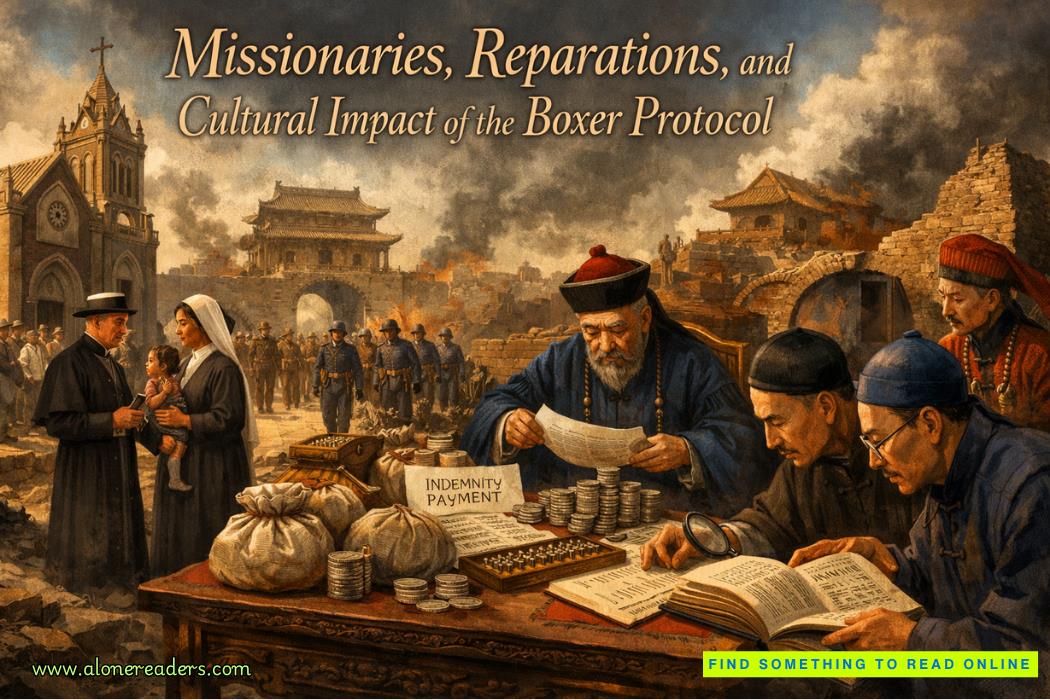The female squirrel chattered, then picked up her babies one by one and carried them back into the far corner of the hollow. It was cool and slightly damp, smelling of rich earth and autumn leaves. “Thank you so very much.” Buschig squeaked and snapped his tail again before he trotted over to join his family at the back of the root hollow.
Makellos drank his fill of water from the creek and stripped off his clothes to wash himself. It was very cold, but he felt better being clean again. He then curled up in the dimness of the little den and gave the family of squirrels a grateful smile. He wrapped his cloak around him as best he could, and, using his arm for a pillow, closed his eyes. Within moments, he was fast asleep.
Four
When he awoke the next morning, the largest squirrel sat at the entrance of the little cavern, as if standing guard. Makellos gave him a smile. “Good morning, Herr Buschig.” He sat up, brushing off his clothes that still looked completely immaculate, despite having slept all night in them on the ground. He glanced down to find that there was a pile of berries, mushrooms, and nuts sitting on a leaf nearby. “Is this for me?” he asked.
Buschig twitched his tail.
“Thank you,” Makellos said, taking one of the berries and popping it into his mouth. It was fat and sweet, as good as anything he had eaten in the palace. Of course, the animals would know where to find the best fruit in the forest, even in the midst of a famine. He ate everything in the little pile except for one large berry, which he offered to Frau Buschig who lay on her side at the back of the hollow, her three babies nursing. She took it in her little scratchy paws and nibbled on it gratefully.
Makellos turned to the father squirrel with another grateful smile. “Thank you for inviting me into your home and takingcare of me, Herr Buschig. But I can’t stay here forever. Do you know if there’s somewhere in the forest I can go? Or the mountains?”
Buschig chattered, his little whiskers quivering, and he gave a little scamper into the woods before coming back, as he had yesterday. Makellos bid goodbye to Frau Buschig and the babies before crawling out of the little hollow and rising to his feet. He stretched as best he could. He was unaccustomed to lying on the ground, and his whole body ached from the coolness of the night and the hardness of the earth, but he was still alive. He turned and followed Buschig into the trees. So far, the kindly squirrel had not steered him wrong.
They walked for a while, stopping a few times when they found water for Makellos to quench his thirst. The sun was hot overhead, though the trees offered ample shade. They really were quite beautiful, with their radiant halos of reds and oranges and yellows. And when he sang again, animals poked their heads out of trees and burrows and dens to listen. The forest was alive with life, and he was too. He felt so much more positive that he could make it through this trial. The thought of leaving Falchovari, the only home he had ever known, pained him deep inside. He had barely been able to see any of it and meet its people, but what he had seen on his brief travels was enough for him to know that the kingdom was in trouble. The famine was making everyone suffer. He couldn’t blame the people for being angry. The Queen had done nothing to ensure that her subjects were taken care of. They were poor and hungry and lost, just like he was now, with no hope of a better life. He wished there was something more he could do. He was a prince, but he had never been allowed to do anything helpful.
He was so lost in his own thoughts that he nearly tripped over Buschig when the squirrel came to an abrupt halt. Buschig chattered at him, his quivery nose pointed ahead. Makelloscould see what looked like a sunny clearing in the trees, and he hurried up his steps as Buschig scampered toward it. When he stepped through the tree line, the sight that greeted him was most welcome. It was a quaint little single-story cottage. The walls were made of a combination of wood and stone, the roof thatched with straw and water reeds. There was a well out front, and the windows appeared to be patterned glass. Off to the side of the house was a little garden patch. Makellos drew closer to inspect it. Weeds grew out of control over the plants within, so much so that it was difficult to see where weed ended and sprouted vegetable began. The few vegetables he spotted were not as big and plump as the vegetables he was used to seeing on the table at the palace. His stomach growled in hunger, and he reached to take several small tomatoes off the vine to eat. He felt ashamed at not asking permission first, but hopefully he could offer a trinket or service to make up for his wild breach of etiquette.
There was no sound from the house, and no smoke emerged from the stone chimney. Curious, he moved back around to the front of the house. The front door was made of heavy slabs of wood, but it stood slightly ajar. This far into the woods, perhaps there was no fear of thieves. Makellos peered inside but could see nothing in the dimness. He rapped his knuckles lightly upon the door. “Hello? Is there anyone at home?”
He waited for a moment, but only the silence of the forest answered him. He knocked again, but there was no movement from within. He hated to intrude, but the doorwasopen. Perhaps no one lived here any longer. He pushed the door open wider. Its hinges gave a rusty creak that sounded much too loud in the stillness. The lintel of the doorframe was right about the height of his head. Makellos was not a particularly tall fellow, and the doors at the palace were quite tall and grand. Was thathow peasant dwellings were built? To conserve heat, perhaps? He ducked his head to enter the little cottage.
Inside, it was quite dim. Makellos had to squint to see into its dusky interior. Patches of forest sunlight slanted through in several places, and Makellos realized as he looked up that the thatching in the roof had worn away, leaving several holes that showed the sky above.
The space that he entered was a large single room, with a long table and benches laid out in the center of it, upon which sat many pewter cups, plates, and silverware, still sporting a few crumbs. There was a large stone fireplace and hearth that was currently unlit. There was a washtub with a pump, and various nooks and crannies stuffed with all manner of things needed for habitation. A clothesline was run between two beams, and several bedraggled-looking shirts and trousers hung from it. There was a single door off to the left that was closed tightly. Leading to a bedroom and washroom, Makellos guessed. The few pieces of furniture in this area were tattered and in various states of disrepair. The room smelled of dust and clothing that needed a wash. But it did not seem as though it had been abandoned. Someone was living here, perhaps currently out cutting wood or bringing things to market.
He didn’t wish to intrude, but this was the only house he had seen since he had entered the forest; he might wander for days without finding another. He would stay until the owner returned home, beg a reprieve for the night, and then would continue south in the morning.
He glanced back to see Buschig sitting on the doorstep, giving him a hopeful look. Makellos gave him a deep bow. “Thank you, Herr Buschig. I am forever in your debt for your kindness.” The squirrel bowed his head in return, then turned and scampered back into the forest to return to his family.
Makellos spotted a lantern hanging near the door with some striking sticks to light it. The front window was close to it, feeble light attempting to make its way through the glass. He realized as he approached it that the windows were not actually stained glass; they were just so covered in grime that the sun couldn’t reach through. “Well, that won’t do,” he said out loud to himself. He pulled his sleeve down over his hand and used it to wipe away the layers of dirt from one corner of the glass. A shaft of early afternoon sunlight slanted through the spot, and his sleeve was none the worse for wear with its enchantment.
“I can wash the windows,” he said out loud to no one in particular, but it was a little more reassuring than the silence of the empty cottage and surrounding forest. He might as well make himself useful while he waited for the occupant.
He went to the pump and washtub. The tub was filled with all manner of dirty dishes and cooking utensils. He would wash those as well, once the windows were clean enough to offer him better light. He filled a bucket with water from the pump that gushed cheerfully, then found a pile of rags. He set about to washing the windows, first from the inside, then from the outside. There was something very satisfactory about removing the layers of grime and dirt from the window panes, leaving them clear and sparkling, catching the warm sunlight.
Once all of the windows that showed into the main room were clean, he returned to find the inside much improved by the light. Dust caught the sun and glimmered in the air like diamonds, but the place did seem to be quite cozy. He was getting warm in his royal clothing, so Makellos decided to take off the blue tunic and red cape he wore and rolled his shirtsleeves up past his elbows. He so rarely was in such a disheveled state of undress, but he had seen many of the stable hands dress this way, and he realized he found it quite freeing. Being able to move without the restriction of the pompous clothing was a relief.
He left the door open to catch the afternoon breeze as he set about to washing the pile of dishes in the washtub, followed by the ones on the table. He stacked them neatly to dry. His hands were beginning to prune; oh, how his mother would scold him if she saw him now!
There was a large cast iron cauldron near the fireplace. It looked as though it hadn’t been washed in a year. He knew from his many adventures in the palace kitchen how important a cauldron could be for cooking and heating water. He worried he wouldn’t be able to lift it if it was filled to the brim with water, as it was quite large, so he drew himself another bucket of water, grabbed a sliver of soap, and moved over to the cauldron. He tipped it carefully on its side, making sure it was not going to roll anywhere, before he got down on his knees, dipped a rag in the water, and began to wash.
After a few minutes, Makellos began to sing as he scrubbed the inside of the large cauldron. The reflection of his voice off of its heavy metal interior was oddly fascinating. It certainly beat the silence around him. He let out an experimental whistle, delighting in the way the high note pinged off the metal and fluttered about his head like a butterfly. The Queen had always discouraged him from whistling; it was unbecoming of a prince, and it would create wrinkles around his lips. He wasn’t sure why that would be a concern. He was young, and even still, wrinkles were just a part of life. Whistling was quite fun, just another way to make music. And the sound echoing inside the cauldron made him laugh. He couldn’t remember the last time he had laughed.
He slid back out of the cauldron, swiping his ebony hair out of his eyes with his forearm before he froze. He was not alone. Someone was standing in the open doorway of the cottage. It took Makellos a moment to make out the details of the figure silhouetted there. He was dressed in tattered clothes that looked to be more patches than actual clothing. He had protruding ears,big blue eyes, and a shock of bright red hair. At first, Makellos thought the person to be a child, for his stature was much shorter than his own. But, the prince realized, the person’s face was much older than a child’s, though his cheeks were bare and soft. And his proportions were strange. His head seemed a little larger than it should be, and his arms and legs were shorter and thinner, giving his torso a rather blocky look, despite the fact that he was nearly as thin as the prince.
The two stared at one another for a moment before Makellos realized that this must be the person who lived in this cottage, and he had just come home to find a stranger on his knees, scrubbing the pots and pans. He gave the young man a smile, the friendliest he could, pushing himself to his feet, his back giving a little protest at the change in position. The red-haired man in the doorway backed up a step, and Makellos held out his hands quickly from his side. “I’m sorry if I startled you,” he said quickly. “I’m unarmed, I mean you no harm.”
The young man’s shoulders were clenched and slightly turned away from him, as if expecting a blow. No doubt he did not receive many visitors this far into the wilder parts of Falchovari. Makellos kept his polite smile in place. “I’m very sorry. I was lost in the woods, and I needed a place to stay.” If he had had any money, he would have offered it.
The young man slowly turned toward him again. Makellos could see that over his shoulder he had a rope, in which was tied a bony dead hare and a scrawny-looking pheasant. It appeared that the young man had been out hunting for a meal. He had a bow strapped to his back. But he made no move to grab it, only continued to stare at him.
Makellos wondered if it was wise to give the young man his real name or not. Despite the fact that the Queen ruled the kingdom, he was still a descendent of hers and therefore might be seen as being partially responsible for the troubles ofthe peasantry. But on the other hand, he thought, if he was truthful about who he was and why he was in this stranger’s house, perhaps the young man would be understanding and appreciative of his honesty. He took a slow step, keeping his hands out. “My name is Makellos.”
No recognition flickered in the young man’s eyes. Perhaps he did not know the name of the prince who lived so far north of him. Makellos took several more steps. The young man did not cower again, though he made no move to approach him either. Now that they were closer, he could see that the man was probably a handful of winters older than his own twenty, despite his small stature.
“Do you live here?” Makellos asked, gesturing a hand around him to the humble abode.















